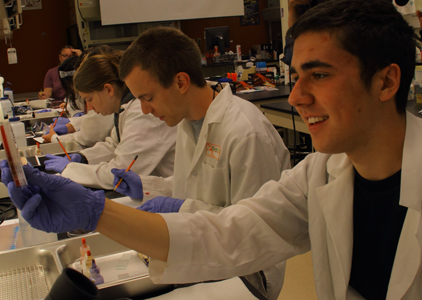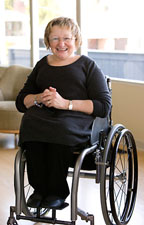Summer Study: What Do Phase II Scholars Do?
Phase II Scholars return to the UW Seattle campus for their second Summer Study. They meet the Phase I Scholars, learn about college life and career preparation, and participate in a one-week workshop with postsecondary instructors.
A Climate of Change
Phase II Scholars Louis, Abby, Josh, Leo, and Ryan participated in the workshop "A Climate of Change." This workshop was presented by staff and scientists associated with the National Oceanic and Atmospheric Administration (NOAA) and was coordinated by Julie Peddy. In this workshop, the Scholars learned how climate change is affecting different parts of the world. They watched video clips, listened to speakers, and conducted experiments.
Dr. Stephanie Moore of Northwest Fisheries Science Center kicked off the week of learning with an introduction to climate change and variability. Dr. Christopher Sabine, an oceanographer, talked about ocean acidification and described how and why the oceans are becoming more acidic. Scholars learned how salmon runs are being affected by climate change and human actions. Dr. Mark Scheurell told us how the dams being built along the Columbia and Snake Rivers are affecting salmon runs. El-Nino predictions were also presented by the Science and Operations Officer for the National Weather Service, Kirby Cook. Rounding out the week was a discussion led by Dr. Jameal Samhouri of Northwest Fisheries Science Center regarding the effect of climate change on fisheries.
Germ Forensics

"This is the best workshop of Summer Study," said Teryn Allen and Theresa Britschgi of Seattle Biomedical Research Center at the kick-off the Germ Forensics workshop. As Interns, we had the opportunity to participate in this super amazing class along with Phase II Scholars Allegra, Shelby, Anna, Chris, Alex, and Reese.
We started off the week testing our own bacterial flora using samples from our armpits, toes, eyelashes, and even beards. We then cultured the sampled bacteria on agar plates and made slides, so we could view the bacteria under a microscope.
Then we learned about the HIV virus in the HIV Testing and Epidemiology of Transmission lab. We learned that the HIV virus tends to replicate rapidly in infected people's blood, and in response to this, patients will start making HIV-specific antibodies and T cells. The presence of HIV-specific antibodies in the blood can be tested using a biochemical technique.
To conduct our own HIV test, we went back to the lab. One of the tools we used was a micropipette. This tool dispenses liquid in the range of microliters. For some of us it was the first time working with micropipettes, so we practiced for a while before we did an actual lab test. To conduct the test we coated the bottom of a well plate with an HIV protein. Patient serum was then added to each well, and, if HIV-specific antibodies were present, they would bind to the HIV protein.
In addition to learning about bacteria and HIV testing, we learned about malaria, how to test for bacteria-killing agents, and tuberculosis. Thank you to Teryn and Theresa for teaching us more about bacteria and germs. You were right, it WAS the best workshop of Summer Study!
Obama Appoints Karen Braitmayer to U.S. Access Board

Congratulations to DO-IT and AccessSTEM Mentor Karen Braitmayer for her recent appointment to the US Access Board by President Obama. The Board is an independent Federal agency that provides leadership in accessible design under the Americans with Disabilities Act (ADA) and other laws.
Braitmayer commented, "I am very honored to have been selected, and I hope I can do a great job." Braitmayer is a registered architect and principal with Studio Pacifica, an architectural consulting firm focused on accessibility and accessible design. She regularly advises state agencies, local governments, school districts, other architects, and home builders and owners on accessibility under various laws, including the ADA and the Fair Housing Act, and on compliance with state codes in housing, commercial, retail, institutional, and educational projects. For more information about the Access Board and its membership, consult www.access-board.gov.